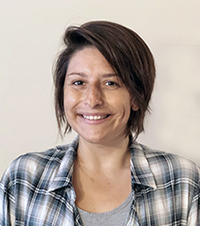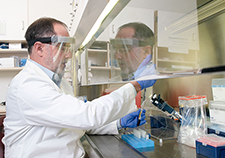Office of Research & Development |
 |


As the largest integrated health care system in the country, VA offers many opportunities to develop new AI applications to support Veterans' health care. The department has several big data repositories, including the Million Veterans Program. (Photo for illustrative purposes only. ©Getty Images/Monsitj)
July 1, 2022
Contributed by the VA National Artificial Intelligence Institute
"Working with the NAII has been more than fantastic. There is the opportunity to work on big impact problems such as elevating AI solutions across the entire VA network."
Agata Ciesielski, a fellow in the White House Presidential Innovation Fellowship (PIF) Program, worked with National Artificial Intelligence Institute (NAII) at the U.S. Department of Veterans Affairs (VA) to help develop the VA Artificial Intelligence (AI) Strategy. She also co-authored a white paper, “AI Strategies and Synergy in the Federal Space” with NAII director Gil Alterovitz, and contributed to implementation guidance for Executive Order 13960 on Trustworthy AI

Agata Ciesielski is a fellow in the White House Presidential Innovation Fellowship Program. She is working with the VA National Artificial Intelligence Institute to help develop new AI strategies.
However, her interest in AI was “a mistake,” says Ciesielski. During her undergraduate fellowship at the National Aeronautics and Space Administration (NASA), the principal investigator assigned her to work on neural networks, thinking it was close to her major of neural engineering. As she learned more about neural networks, she became fascinated with AI’s blend of mathematics, statistics, and psychology.
Ciesielski spent time collaborating with colleagues at NAII because she had previously worked on AI applications to health care. As the largest integrated health care system in the country, VA offered myriad opportunities for further work on AI in health care. VA has several big data repositories, including the largest genomic knowledge base in the world linked to health care information, that can be used for AI. “This positions VA to be a place of high impact for a population of people who have given so much to protect our country,” says Ciesielski.
She notes that there is an urgent need to create the infrastructure to amplify AI solutions. For example, if an algorithm shows promise throughout testing, there needs to be a system to try it on larger populations and make system updates. She adds, “VA is well situated to develop these complex systems. [With such a large system,] VA has potential medical diagnostic solutions, a large amount of data to create the solutions, and the basic infrastructure to deploy diagnostic tools at the enterprise level.”

AI to Maximize Treatment for Veterans with Head and Neck Cancer

VA Further Develops Its Central Biorepository: VA SHIELD
Ciesielski explains that, as AI becomes more integrated into the public sector, there is a “dire need for a common language and approaches.” While there have been successful AI applications and demonstrations at the project and program level in the federal government, efforts are often siloed. Organizational level standards are needed to elevate solutions. Greater coordination across agencies would help reduce duplication and maximize impact.
Ciesielski co-developed the white paper on AI strategies in the federal space to help agencies understand the government’s holistic approach to AI, while crafting their own AI strategies. “The research provides a framework, and each agency must align the AI approach with its organizational mission,” says Ms. Ciesielski. The paper has been shared with the White House, Chief Information Officer/Chief Data Officer Councils, and other government policymaking groups.
When asked what she would tell potential fellows, Ciesielski responded, “The beauty of the program is that PIFs are placed and challenged to work on large interagency problems that we as individuals are passionate about. PIFs connect with other fellows and federally employed PIF alumni like Dr. Gil Alterovitz, who empower fellows. We are introduced to leaders to help make big things happen.”
“Working with the NAII has been more than fantastic,” says Ciesielski. “Not only is there the opportunity to work on big impact problems such as elevating AI solutions across the entire VA network, but Gil’s engagement and strong connections to interagency efforts ensure that all work is in sync with federal, industry, and academic cutting-edge efforts and practices.”
Applications to become a 2023 Presidential Innovation Fellow are open now through July 8 at presidentialinnovationfellows.gov/apply
VA Research Currents archives || Sign up for VA Research updates